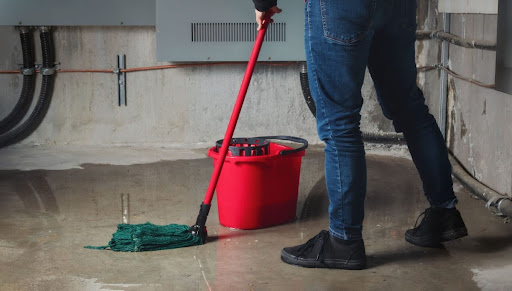When you’re a homeowner, there’s a long list of potential issues you might encounter over the years. One of the most stressful problems is a leak. Water leaks can show up in various places — roofs, pipes, and fixtures — but one of the trickiest types to catch is a slab leak.
Unfortunately, slab leaks can cause considerable damage if left undetected, leading to costly repairs and even threatening the structural integrity of your home. Review the most common symptoms of a slab leak and what you can do to get it fixed before the problem grows.
What Is a Slab Leak?
Before we get into the signs of a slab leak, let’s take a quick look at what it is. A slab leak happens when the plumbing pipes beneath your home’s concrete foundation develop leaks. These pipes can be either water supply lines or drainage pipes. Over time, wear and tear, soil shifting, or poor installation can lead to cracks or breaks in the pipes.
A slab leak is no small issue — it can weaken your home’s foundation, cause soil erosion, and lead to mold or mildew problems.
5 Symptoms of a Slab Leak You Should Watch Out For
Not all leaks are obvious, and slab leaks can be particularly hard to spot since they’re lurking beneath your home. Here are 5 common signs that you have a slab leak.
Unexplained Water Bills
One of the most common early signs of a slab leak is a sudden spike in your water bill. If you haven’t changed your water usage and there’s no visible leak, the problem might be hiding under your concrete slab. Even small leaks can lead to gallons of wasted water every day, which is reflected in your monthly bill.
Pay close attention to your water meter. If you suspect an active leak, shut off all the water in your home and check the meter. If the dial is still spinning, you might have a leak somewhere in your plumbing system, possibly under the slab.
Hot Spots on the Floor
Have you ever walked across a section of your main floor and noticed an unusually warm spot? This can be one of the symptoms of a slab leak, as it could indicate that there’s a leak in your hot water pipes beneath the slab. Since hot water lines are typically under more pressure, they tend to be more prone to leaking, and the warmth from the water will heat up the floor.
If you have hot spots on your floor that can’t be explained by heating systems or appliances, it’s worth investigating further for a potential slab leak.
Water Pooling Around the Foundation
Water pooling around your home’s foundation or standing water in your yard, especially when it hasn’t rained recently, could point to a slab leak. The water from the broken pipe will often seep into the surrounding soil, and you’ll eventually notice puddles or wet spots around the house.
This excess moisture can lead to soil shifting, which can weaken your slab foundation over time. Left unchecked, this can even result in cracks in your walls or floors.
Low Water Pressure
If you notice a drop in your water pressure, it could be due to water leaking out of a pipe before it reaches your faucet or shower. While there are other causes for low water pressure, such as clogged pipes or issues with the water supply, it can also be a sign of a slab leak.
Check to see if the drop in pressure is consistent across multiple fixtures. If it is, you might need to have a professional plumber assess your home for leaks.
Mold and Mildew
The presence of mold and mildew is never a good sign in a home, notably if there’s no obvious reason for it. When water seeps out of a pipe under the slab and into your floors or walls, it can create the perfect environment for mold spores to thrive. This often results in that musty, damp, mildew smell that just won’t go away.
You might also notice mildew growth on your floors, baseboards, or walls. Since mold and mildew can pose health risks, it’s important to address this issue right away. This is one of the most notable signs that you have a slab leak, so don’t hesitate to take action. The longer you wait, the worse the damage will get.
What Causes a Slab Leak?
There are several reasons why slab leaks occur, and they often develop over time. Some of the most common causes include:
- Shifting Soil: As the ground beneath your home settles or shifts, it can put pressure on the pipes, causing cracks or breaks.
- Corrosion: Pipes made from materials like galvanized steel or copper pipes are prone to corrosion over time, especially when they’re exposed to minerals in the soil or water.
- Poor Construction or Installation: If your home’s plumbing wasn’t installed properly or if the pipes were damaged during the construction process, leaks could develop earlier than usual.
- Wear and Tear: Over the years, normal wear and tear can lead to leaks, especially if your pipes are older.
How to Fix a Slab Leak
If you suspect a slab leak, it’s necessary that you take action right away. Ignoring the problem can lead to extensive damage, costly repairs, and potential health issues from mold or mildew. Here’s how to approach slab leak repair:
Call a Professional Plumber
Since slab leaks occur under the foundation of your home, they’re not easily accessible. You’ll need a professional plumber with experience in slab leak repair to locate and fix the issue. Plumbers use special equipment like electronic listening devices and pressure sensors to detect the leak without tearing up your floor.
Consider Your Repair Options
Once the leak is detected, your plumber will recommend the best repair method. This might include:
- Pipe Rerouting: If the leak is in an old pipe, the plumber may suggest rerouting the water line above ground instead of repairing the damaged pipe under the slab.
- Spot Repair: For smaller leaks, a plumber might dig directly down to the leak and repair the specific section of the pipe.
- Pipe Lining: In some cases, a flexible epoxy liner can be inserted into the damaged pipe, which hardens and seals the leak without having to excavate the floor.
Early Detection Saves You Money
Although it’s vital to be aware of the signs that you have a slab leak, knowing when to take initiative is just as important. One of the best ways to avoid costly repairs is through early detection. The quicker you spot the signs of a slab leak, the less damage you’ll have to deal with. If you’ve noticed any of the symptoms of a slab leak mentioned in this blog, it’s time to call a professional for assistance.
If you suspect you may have a slab leak, Magic Plumbing offers expert slab leak repair in San Francisco, and the Bay Area. We have the experience and equipment needed to detect and fix leaks quickly.
Schedule Your Slab Leak Repair Today!
A slab leak is a serious issue, but the good news is that catching it at an early stage can prevent major damage to your home. If you’ve noticed any signs that you have a slab leak, like water pooling, low water pressure, or increased water bills, be proactive about it.
Contact Magic Plumbing today for professional leak detection in the Bay Area! We’re here to help you protect your home from further damage.


